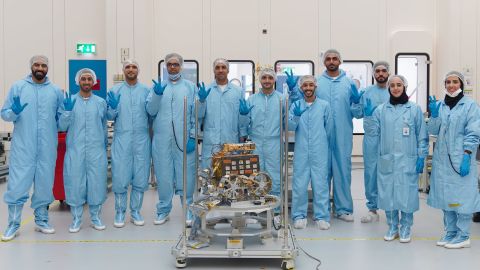[ad_1]
CNN
—
A SpaceX Falcon 9 rocket launched on December 11 from the Cape Canaveral Space Force Station in Florida, carrying into space the first ever Arab-built lunar spacecraft.
The Rashid Rover was built by Dubai’s Mohammed bin Rashid Space Centre (MBRSC), in the United Arab Emirates (UAE), and is being delivered by the HAKUTO-R lander, engineered by Japanese lunar exploration company ispace. If the landing is successful, HAKUTO-R will also become the first commercial spacecraft ever to make a controlled landing on the moon.
The mission is taking a low energy route to the moon and is due to arrive around April 2023. Once there, the rover will spend one lunar day (equivalent to 14.75 days on Earth) on the surface, conducting its main operations. It will spend a second lunar day conducting secondary operations, to check whether the rover will survive the moon’s tough nighttime environment, before decommissioning.
Scheduled to touch down in the Atlas crater the northeast part of the moon, the rover has been designed to withstand the lunar night, when temperatures can reach as low as -183°C, or -297.4°F.
The Rashid Rover, named after the late Sheikh Rashid Al Saeed, the former ruler of Dubai, will analyze the plasma on the lunar surface and conduct experiments to understand more about lunar dust. Razor-sharp lunar dust particles can stick to and erode spacesuits and equipment, causing operational problems for astronauts.

The rover will be entirely solar-powered and equipped with four cameras, including a microscopic and thermal one.
The launch comes shortly after that of NASA’s Artemis I lunar mission and marks the first step in the UAE’s ambitious moon exploration program. The Gulf state plans to send several vehicles, including rovers and orbiters, to the moon, with a second rover planned to launch as soon as 2025.
Construction of the 10kg, four-wheel Rashid Rover began in 2017 at the MBRSC. It was designed by an entirely Emirati team. “The team did a great job in starting the mission and designing it,” Hamad Al Marzooqi, project manager of the Emirates Lunar Mission at the MBRSC told CNN.
The MBRSC is also using the mission to fuel ambitious plans for a Mars colony. It is hoping to build the first human settlement on the Red Planet by 2117. Al Marzooqi hopes that the lunar surface mission will be a stepping stone to Mars.
“We are starting small,” he says, “but we hope that this small step will be eventually the starting point to reach our targets.”
Source link



